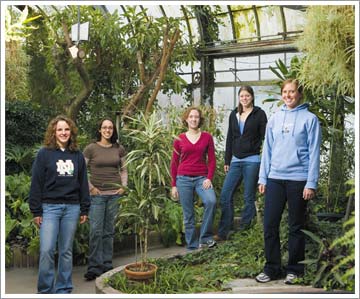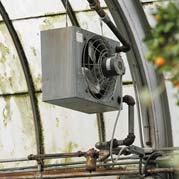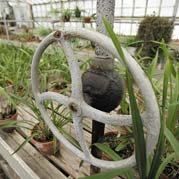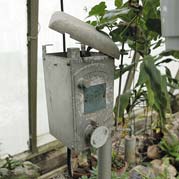Green Places
“A thing of beauty is a joy forever.” That’s how
the saying goes, but as 10 students in the Notre Dame section of
the Society of Women Engineers (SWE-ND) found out, that is not always
the case when a city decides it needs to cut costs. At risk in late
2006 were the Ella Morris and Muessel-Ellison Botanical Conservatories
and Potawatomi Greenhouses in nearby South Bend, Ind.
Since the
1920s the greenhouses have supplied flowers and plants for South Bend parks,
the Potawatomi Zoo, municipal golf courses, fire stations, and other local
facilities. In the 1960s the city began to build the conservatories, which
now showcase tropical plants, a desert dome, and waterfalls. Generations of
residents have enjoyed the facilities and attended flower shows, meetings,
and even weddings on site.
Unfortunately,
the structures cost the city significant money to operate — up to $200,000
annually for utilities alone. As city officials met with the parks department,
local residents, representatives of the South Bend and St. Joseph County Historic
Preservation Commission (HPC), and members of the Michiana Garden Club, the
Notre Dame team was putting the finishing touches on an energy-efficiency study,
which they shared with the parks board and other city officials.
According
to Jen Vogel, SWE-ND vice president, she and the other team members analyzed
the heating and irrigation systems of the conservatories and greenhouses. The
purpose of the project was to identify the greatest sources of inefficiency
and offer solutions, including the projected expenses associated with implementing
the suggested changes.
The first
area of concern identified by the SWE-ND team was the fact that the facilities’ heating
system was manually controlled. For example, if a temperature problem were
to arise in the middle of the night, greenhouse personnel had to go to the
facilities and physically adjust the decades-old boilers. In addition, many
of the fans designed to distribute air throughout the facilities, as well as
several of the air vents on the top of the buildings, no longer functioned.
Vogel
also said that many newer greenhouses use a thermal blanket for added insulation.
After interviewing many experts, the team suggested that the installation of
a double-layered blanket would help the single-pane glass in the facilities
maintain a constant temperature. They also recommended replacing the current
irrigation system with an automated system to better control the amount of
water used and eliminate labor costs associated with hand watering.
A mid-September
meeting of the board of parks commissioners offered a bleak outlook for the
conservatories and greenhouses, as the recommendation was made to close the
facilities. But within a month — after receiving the student report and
a petition signed by hundreds of residents — South Bend mayor Steve Luecke
and Catherine Hostetler, the executive director for the HPC, were able to announce
the receipt of a grant for repairs to the facilities. Luecke also met with
representatives of a local bank to organize capital for ongoing operating needs,
which would support the next phase of improvements and efforts to reach maximum
efficiency.
Although
they did not accomplish the task alone, SWE-ND team members were among the
many volunteers and local businesses who worked to keep the greenhouses open
for the community to enjoy. Team members were: from the Department of Chemical
and Biomolecular Engineering — Vogel (a junior), Courtney
Darlington (a junior), Megan Kimmet (a senior),
and Julie
Matteo (a junior); from the
Department of Aerospace and Mechanical Engineering — Camille
Legault (a junior), Katie Murphy (a senior), and Rachel
Paietta (a junior); from the
Department of Civil Engineering and Geological Sciences — Charlotte
Low (a junior); from the Department of Computer Science and Engineering — Tamika
McLean (a junior); and from the Department of Electrical Engineering — Colleen
O’Hagan (a senior).

Team members left to right, included Julie Matteo,
Camille Legault, Megan Kimmet, Courtney Darlington, and Jen Vogel.
Not pictured are Katie Murphy, Rachel Paietta, Charlotte Low,
Tamika McLean, and Colleen O’Hagan
|





